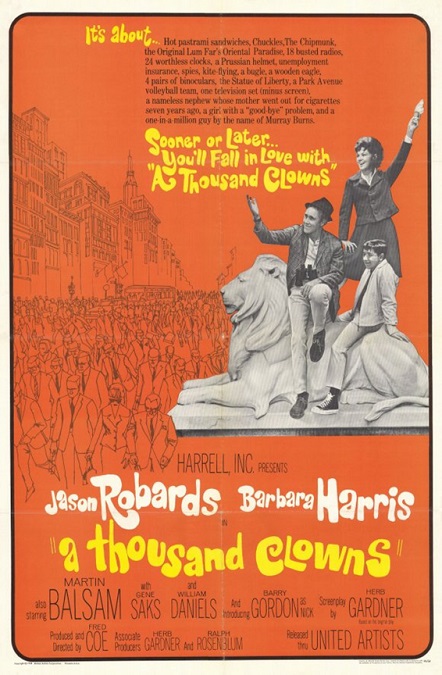
A Thousand Clowns – 1965
I didn’t particularly like this film. It wasn’t a bad movie. It wasn’t poorly made. It wasn’t slow or boring. The acting was just fine. So what was it that turned me off? It was the general message that the film was trying to portray, which was that being an irresponsible person is a goal everyone should have, and that being a responsible person is nothing more than a necessary evil.
I know that I’m oversimplifying the message, but I think that’s what it boils down to. The movie glorified having the attitude that people who work hard for a living are soulless conformists who have lost touch with their inner child. Jason Robards played the film’s lead, Murray Burns, guardian to his young nephew, Nick, played by Barry Gordon. One of the first things he says, when the boy asks him to get a job, is “Nick, in a moment you’re going to see a horrible thing. People going to work.”
We are then treated to the opening credits which is made up of 2 and a half minutes of images of large crowds of people walking the streets of New York as they hurry to get to their jobs while loud marching band music that belongs in a three-ring circus beats you over the head. I was very nearly offended. I’m a responsible, hard-working adult, and I was just told that I am a fool for being so.
The film’s drama comes when the Child Welfare Board begins to question Murray’s ability to be a fit parent for young Nick. I have to say, I was on their side, and I don’t think I was supposed to be. Murray had been unemployed for the past 5 months, living on unemployment insurance, all because he grew fed up with the banality of working at a job he hated, and quit. Never-mind that if you quit your job, you are not eligible for unemployment insurance. And never-mind that unemployment insurance only last for a certain amount of time. Once it runs out, you get nothing.
Anyway, the Board sends two representatives to investigate the situation. Albert Amundson and Sandra Markowitz, played by William Daniels and Barbara Harris, arrive and attempt to question Murray. He ignores anything they have to say, talks over them, and changes the subject as often as he can. The meeting would have been completely unproductive except that Sandra is utterly unfit to be working for the Child Welfare Board, but I’ll get to that in a bit.
And for that matter, this is a good place to mention how unimpressed I was with Barbara Harris’ performance. She had what I’d like to call the ‘please don’t hurt me’ look. It was a look that stayed with her throughout the entire movie. She always looked like she was on the verge of tears, afraid that her costars were going to start strangling her. Even when her character was supposed to be happy, she had the perpetual countenance of a victim.
The film’s score was made up of more circus music. The director made use of it in a unique, but obnoxious way that was very jarring. It was done on purpose, I’m sure, but I found it upsetting. A lot of the humor used the set-up/punchline format. As soon as a punchline was delivered, the blaring horns and snare-drums would startle me and then abruptly stop as the set-up for the next joke started.
To make a long story short, Sandra blows off her job and gets fired, stays with Murray, and the two instantly fall in love, at which I had to roll my eyes. When Murray realizes that Nick will be taken away from him, he resolves to get a job. He goes to his brother Arnold, brilliantly played by Martin Balsam, who lines up several interviews for him, but the thought of becoming a mindless laborer is so abhorrent to him that he walks out on every one of them.
The “tragic” end of the movie shows Murray taking back his old job as a joke writer for a children’s television show. He sells his soul to the devil and it is implied that both Nick, who ultimately loves him, and Sandra, who has fallen in love with his child-like spirit, will now be living with him.
But I’ll be honest. If it were not for Balsam’s character saying that by responsibly conforming to the demands of society, he has become the “best possible Albert Burns,” the movie would have had very few redeeming qualities.
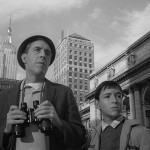


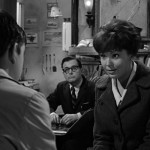
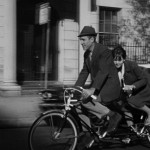
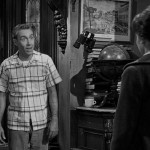
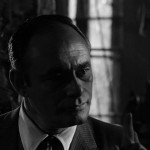
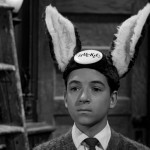
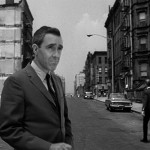
You missed the point. I was about 19 when I saw the movie. It was more about a disillusioned man who had lost his reason, and could only see himself chasing something he lost his love for. Is life just a job? One thing we know, it’s short with fleeting moments.
You are so correct.
I have rarely seen a reviewer so far off the mark. Just watched it again last night. It was as wonderful as I had remembered it from 50 years ago.
You missed the point of this movie. He is comfortable in his own skin, but people are trying to change who he is, and he’ll change to keep his son. It is ultimately about love, and you didn’t get the message of that tragedy.